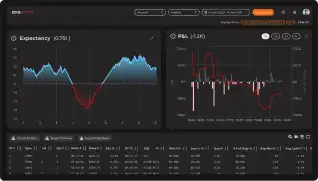
July 15,2024 @08:08 AM
Traders will often hold many assumptions about the markets that can influence their entire trading journey. Remaining stagnant and allowing these misconceptions to fester can lead to fundamental misunderstandings, which in turn can impact decisions and strategies. To address these common misconceptions and provide clarity, we are introducing the Market Mythbusters series, where we will unpack one notable market myth at a time.
Today’s myth is one that we frequently encounter at EdgeClear: “My broker is taking the opposite side of my trades”. This belief is common, and in many spaces within the trading industry, not entirely unfounded. This myth cannot be deemed “false” within the industry at large, as it is true within certain financial institutions and market segments.
However, in the futures market, this is generally untrue. Futures markets are overseen by regulatory bodies such as the NFA and CFTC, and futures products are traded on centralized exchanges like Eurex, ICE, CME, and NYMEX. These centralized exchanges standardize each futures contract through specific criteria such as size and also act as a buyer for every seller and a seller for every buyer.
So, how does EdgeClear fit into this equation? EdgeClear serves as an introducing broker, providing traders with a platform to place buy and sell orders. These orders are then executed on a centralized exchange
In this edition, we will explain decentralized vs. centralized exchanges, the purpose of a clearinghouse and its role within futures trading, and oversight done by regulatory bodies.
Understanding the Myth
The myth that brokers will take the opposite side of their clients’ trades is centered around a deep-rooted mistrust of financial organizations alongside a misunderstanding of market mechanics. This can also be paired with a trader’s negative lived experience within the markets, from things such as slippage or losing trades. These experiences can taint a trader’s perspective of all financial entities and cause them to believe that all brokers have the intention of trading against them.
It’s important to note that decentralized markets can be much less regulated—increasing the likelihood of brokers or market makers to take positions against their clients. This has created an industry-wide stigma that this is common practice, even within centralized exchanges. While this myth may be true in some circumstances, many regulated institutions, such as EdgeClear, follow strict rules that protect client’s trades.
Centralized vs. Decentralized Exchanges
Having a strong understanding of the differences between centralized and decentralized exchanges is extremely important for understanding the complexities of this myth. As mentioned previously, this myth cannot be debunked because of the notable differences in regulatory authority between these exchanges.
Centralized Exchanges
- Regulation — Centralized exchanges must abide by regulatory frameworks that are administered by authorities such as the NFA and the CFTC. They are closely monitored by these authority groups and will incur hefty fines if they do not follow their rules. These regulations have been designed to increase transparency,fairness, and the equal protection of all traders. Brokers, such as EdgeClear, that conduct business within these exchanges are prohibited from trading against their clients because of compliance regulations.
- Higher Liquidity — These exchanges will typically have higher liquidity due to
the fact that they accumulate orders from a larger pool of participants. Some of
the reasons that centralized exchanges have higher liquidity include order book
depth, exchange efficiency, standardization of contracts, and overall trust by
traders in these exchanges. - Heightened Security Measures — Centralized exchanges take security
extremely seriously. Since they are held under a central authority, they have
robust security measures set in place to safeguard users’ funds and personal
information. These exchanges have a significant hold on market security, so it is
vital for them to be able to protect clients against fraud, cyber attacks, and other
threats. - Operational Risks — Like many aspects of the modern world, centralized exchanges heavily rely on technology. Although there have been notable advancements with this technology, it is not without its flaws. These risks include technical failures, cybersecurity breaches, and human errors. Any of these disruptions occurring can have a significant impact on the market, leading to delays in processing and settlement.
Centralized exchanges are platforms in which futures contracts can be traded through a
central space that standardizes, monitors, regulates and facilitates the trading process.
EdgeClear partners with centralized exchanges such as CME Group, Eurex, ICE, ASX,
SGX, and HKEX. Below are some advantages and challenges that are associated with
centralized exchanges.
Decentralized Exchanges
Decentralized exchanges operate without a centralized authority. Instead, they use
blockchain technology and Forex (FX) technology to enable peer-to-peer trading. Some
examples of decentralized exchanges include some FX platforms, CFDs, and a handful
of cryptocurrency exchanges. There are certainly some benefits to these exchanges, but
they also present challenges that can contribute to the myth that all brokers trade
against clients. Some of the advantages and challenges occurring within decentralized
exchanges are noted below.
- Global Access — Decentralized exchanges are much more accessible, which
can be viewed as both a benefit and a hindrance. This means that those who
may be blocked from centralized markets due to their geographic location or
financial status have an opportunity to trade. This accessibility empowers traders
from regions that may have only limited access to more traditional exchanges. - Less Susceptible to Security Risks — Decentralized exchanges are not as
likely to be hit by cyber attacks and market manipulation as centralized
exchanges. This is because these exchanges are not held within one central
space, making it much more difficult for hackers to gain access. While there may
be a lower risk, decentralized exchanges are not immune to security breaches
and other risks. When a trader experiences a security-based monetary loss, it
can be much more difficult to dispute or recover any funds lost compared to a
centralized exchange. - Lower Fees — More often than not, decentralized exchanges will have lower
trading fees than its counterpart, but keep in mind that these fees will vary by
blockchain. These exchanges do not necessarily have the costs associated with
intermediary services and operational overheads that a centralized exchange
would have, reducing the overall fee cost. - Lack of Regulation — Many decentralized exchanges run with loose regulatory
authority, or with none at all. This lack of oversight can have a negative impact on
traders, such as a higher amount of market manipulation.
Exchange Internal Matching Engine
All centralized exchanges have an internal matching algorithm. This technique allows for the exchange to determine current prices opposing an aggressor’s order and assign it a resting order. Using this internal engine makes buy and sell order matching much more efficient while also promoting fairness and transparency. This means that brokers that are utilizing these algorithms are not able to take the opposite side of their clients.
What’s A Clearinghouse?
A clearinghouse acts as a mediator or middleman between two parties that are engaging in a financial transaction. Imagine you are facing an opponent in a sports match, in this analogy you and your opponent would be the buyer and seller, and the clearinghouse would serve as the referee. A referee upholds the rules of the game, keeps track of points, and resolves any disputes. Similarly, a clearinghouse will ensure that financial transactions are completed in a streamlined, fair, and accurate manner between all parties involved
Benefits of Clearinghouses
- Risk Reduction — Clearinghouses provide counterparty risk mitigation by
requiring participants post initial margin, ensuring that if a party were to default,
the other party is protected from loss. Clearinghouses within a centralized
exchange also reduce risk by netting. This is the process in which they aggregate
multiple financial obligations between parties.- Here’s an example of netting: Bank A owes Bank B $20 million and Bank
B owes Bank A $9 million. Netting allows the banks to settle the
difference, therefore Bank A would only have to pay Bank B $11 million.
- Here’s an example of netting: Bank A owes Bank B $20 million and Bank
- Efficiency — By centralizing the process of trade settlement, clearinghouses
standardize and automate the number of transactions needed. This in turn, saves
time, and operational costs, while also reducing the amount of errors in trades. - Transparency — Clearinghouses improve transparency by providing up-to-date
records to all parties involved in a trade. Many will also provide report transaction
data to regulatory authorities, such as the NFA, to further ensure the records are
legitimate and accurate.
Challenges with Clearinghouses
- Market Impact — Given their notable role in centralized markets, clearinghouses
hold a significant influence over their operations. This influence does come with a
heightened responsibility. When a challenge emerges, whether it be operational
glitches or systemic vulnerabilities, the ripple effects can cause hefty disruptions
in the market.
Overall, clearinghouses provide an extra layer of security to protect traders through the successful facilitation of market transactions, but it doesn’t come without its risks. Having a strong understanding of both the potential advantages and the drawbacks of clearinghouses is important for traders looking to navigate futures markets.
A Clearinghouse’s Role in Futures Trading
A clearinghouse reduces risk for both buyers and sellers by acting as the counterparty for every trade. They enter the picture after the buyer and seller execute a trade, finalizing the transaction. Clearinghouses play a crucial role within futures trading, as they ensure a higher level of stability amidst the likely increased levels of leverage and risk. Almost all centralized futures exchanges require their trades to be initiated through a clearinghouse, while the majority of decentralized exchanges do not.
Regulations and Oversight
Regulatory bodies, such as the NFA or the CFTC, play an instrumental role in continuing to uphold the integrity of the futures markets. They strictly enforce rules and regulations to ensure fair trading practices that protect investors. These regulatory bodies also require all exchanges and financial institutions to provide clear and accurate information to traders. They also complete examinations of these institutions and exchanges regularly. In some cases, the exchange itself is a regulatory body for certain clearers. For example, CME is the Designated Self-Regulatory Organization (DSRO) for many clearing firms.
Myth Answered!
While this myth may not be busted, it should be clear as to what financial institutions it is referencing. There are many nuances within the trading world that can lead to market misconceptions or confusion along the way. That’s perfectly okay! Seeking out answers and disrupting your assumptions is the first step towards becoming a more educated and skilled trader and, ultimately, a more well-informed person. By gaining a deeper understanding of myths such as “My broker is taking the opposite side of my trades,” you can significantly empower yourself to make more informed decisions based on facts. Remember, no single person is able to know the ever-evolving markets perfectly and that shouldn’t be your goal.
Our team at EdgeClear encourages you to ask questions and seek out knowledge in every way possible. We are here to support you to become the best trader you can be and to help you achieve your long-term goals within your trading journey. Don’t be afraid to keep questioning, keep learning, and keep growing!
Do Your Part to Debunk This Myth
Want to ensure that your brokers aren’t taking the opposite side of your trades? Join a
registered, reputable brokerage and begin trading your favorite futures products on centralized exchanges with EdgeClear! Get in touch with our 5-Star rated brokers below!
